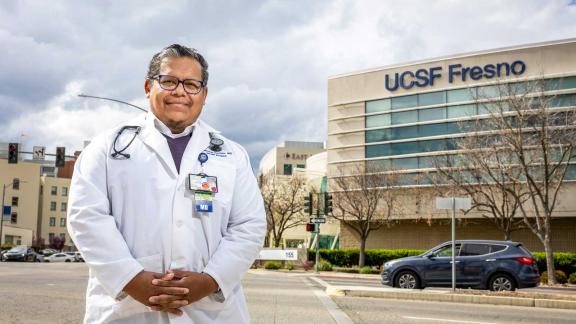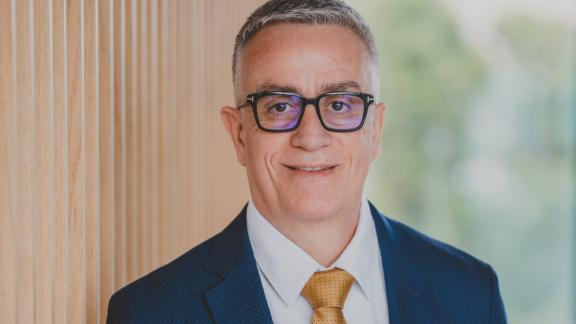WHO: The Academic Senate at UCSF Fresno Medical Education Program will present a series of health-related lectures for the community.
WHAT: The public is invited to hear and ask questions of leading experts in medicine and health sciences at the fifth annual “Mini-Med School 101,” a series of six lectures for the general public on health issues related to the whole family.
WHEN: Tuesday evenings, starting Sept. 6 through Oct. 11, from 5:30 p.m. to 7:30 p.m.
WHERE: UCSF Fresno Center for Medical Education and Research, 155 N. Fresno Street. Parking available off of Illinois Street in the UCSF Fresno lot.
For information, please call (559) 499-6421.
The Neonatal ICU: The State of the Art 2016
Stephen Elliott, MD
Associate Clinical Professor of Pediatrics at UCSF Fresno, Volunteer Series Attending Neonatologist, Community Medical Centers
The Mini Med School journey begins with the smallest and most fragile patients. Neonatology is a subspecialty of pediatrics that consists of the medical care of newborn infants. The role of the neonatologist and other specialists as they work together in the Neonatal Intensive Care Unit (NICU). This incredible presentation includes a virtual tour of the NICU.
Improving Health Care Transitions throughout all Stages of Life
David Lee, MD, FCCP
Center Director, Cystic Fibrosis Program, UCSF Fresno Assistant Clinical Professor of Medicine at UCSF Fresno
The impact of chronic disease, the transition from childhood into adulthood and how the process can be improved with specific diseases will be covered.
Travel Medicine: Around the World in 60 Minutes
Steven Stoltz, MD, FACP
Chief of the Division of Hospital Medicine at UCSF Fresno and former Director of UCSF Fresno Global Health
The world is an incredibly interconnected place. The ease of modern travel and the public’s desire for mobility have created situations in which health care professionals need to think “globally” even at the local level. Travel medicine merges preventative care, detective work, infectious diseases and geographical trends into a specialty that is equally fascinating and dynamic. Recent outbreaks as well as advice for going abroad—and coming back—safe and sound will be discussed.
Is there a Doctor on Board? Emergency Medicine at 30,000 Feet
Susanne J. Spano MD, FACEP
Director, Wilderness Medicine Education, UCSF Fresno
Chair and Medical Director, Department of Continuing Medical Education Community Medical Centers, Fresno, CA
Airline emergencies represent a unique type of clinical encounter - by definition, they are remote from a care facility and treatment is typically limited to a small medical kit on board. This engaging presentation will cover what complaints occur most commonly during airline travel, and the latest research about how best to address them.
Lost in the Wild: A Story of Search and Rescue
Danielle Campagne, MD, FACEP
Associate Professor of Clinical Emergency Medicine at UCSF Fresno Co- Faculty of the UCSF Fresno Parkmedic Program
Imagine going for a day hike—and getting lost for more than a week. This lecture shares the true story of a wilderness search and rescue from Sequoia National Forest from both the searchers’ and the hiker’s perspectives during this dire scenario. Wilderness survival skills along with the necessary items to pack in your own backpack will be covered.
Gun-Related Injuries: Medical Perspectives on an American Epidemic
Patrick J. MacMillan, MD
Associate Clinical Professor at UCSF Fresno
Chief of Hospice and Palliative Medicine, UCSF Fresno
Gun-related injuries have been labeled by the American Medical Association as a public health crisis, yet productive dialogue can be challenged by the emotional, social and cultural factors that accompany this topic. This lecture is a sincere inquiry about the causes of and solutions to the gun violence epidemic and best practices to keep our communities protected against firearm accidents and injuries.
When Skin Tells a Story: Rashes from Near and Far
Greg Simpson, MD
Assistant Clinical Professor at UCSF Fresno Medical Director, UCSF Fresno Dermatology
Changes in a person’s skin can represent many things from unsafe behavior during a local epidemic to an unlucky transmission from across the globe. In this session, sexually transmitted diseases that are prevalent right here in Fresno as well as a collection of unusual dermatology syndromes from international settings will be discussed.
Recent Advances in Stroke Care
Amir S. Khan, MD
Assistant Professor of Neurology and Neurosurgery at UCSF Fresno Medical Director of Stroke
Strokes are the leading cause of disability and the fifth leading cause of death in the United States. Fortunately, stroke care has advanced considerably in recent years. In this state-of-the- art lecture, the root causes, recognizable patterns, and current treatments of stroke will be explained.
Women and Heart Disease
Teresa Daniele, MD
Assistant Clinical Professor at UCSF Fresno
Heart disease is the number one cause of death in women. This presentation will discuss what heart disease actually is, who is at risk for developing the disease and how it can be prevented.
Every Breath You Take: Pulmonary Illnesses and Management
Vijay P. Balasubramanian, MD, FCCP, MRCP (UK) Associate Professor of Medicine at UCSF Fresno Division of Pulmonary & Critical Care
Medical Director, Pulmonary Hypertension Program, UCSF Fresno
This talk will summarize the process of respiration and explain the basis of some of the common pulmonary illnesses encountered in the community.
Simulation in Medical Education: Hands on Experiences
Stacy Sawtelle Vohra, MD
Director of Education, UCSF Fresno Clinical Skills Lab
Associate Director of the Emergency Medicine Residency Program, UCSF Fresno
Stuart Maxwell, MD
Health Sciences Assistant Clinical Professor, UCSF Fresno Emergency Medicine Simulation Technical Director, UCSF Fresno
Medical Director, CRMC Emergency Department
Ever wonder how doctors learn to be doctors? Transitioning from medical student to physician requires deliberate practice of medical decision making skills and procedural skills prior to taking care of real patients. Lecture participants will experience firsthand the application of high-tech simulation in medical education. Mini-Med students will have the opportunity to interact with high-fidelity mannequins and task trainers used to teach medical students and physicians.





